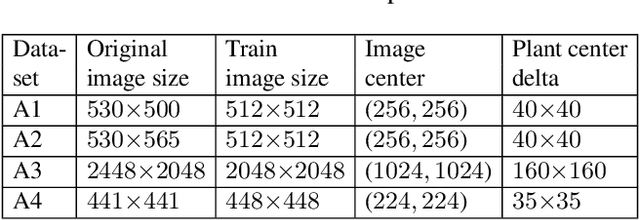Data Augmentation for Leaf Segmentation and Counting Tasks in Rosette Plants
Paper and Code
Mar 20, 2019



Deep learning techniques involving image processing and data analysis are constantly evolving. Many domains adapt these techniques for object segmentation, instantiation and classification. Recently, agricultural industries adopted those techniques in order to bring automation to farmers around the globe. One analysis procedure required for automatic visual inspection in this domain is leaf count and segmentation. Collecting labeled data from field crops and greenhouses is a complicated task due to the large variety of crops, growth seasons, climate changes, phenotype diversity, and more, especially when specific learning tasks require a large amount of labeled data for training. Data augmentation for training deep neural networks is well established, examples include data synthesis, using generative semi-synthetic models, and applying various kinds of transformations. In this paper we propose a method that preserves the geometric structure of the data objects, thus keeping the physical appearance of the data-set as close as possible to imaged plants in real agricultural scenes. The proposed method provides state of the art results when applied to the standard benchmark in the field, namely, the ongoing Leaf Segmentation Challenge hosted by Computer Vision Problems in Plant Phenotyping.
 Add to Chrome
Add to Chrome Add to Firefox
Add to Firefox Add to Edge
Add to Edge